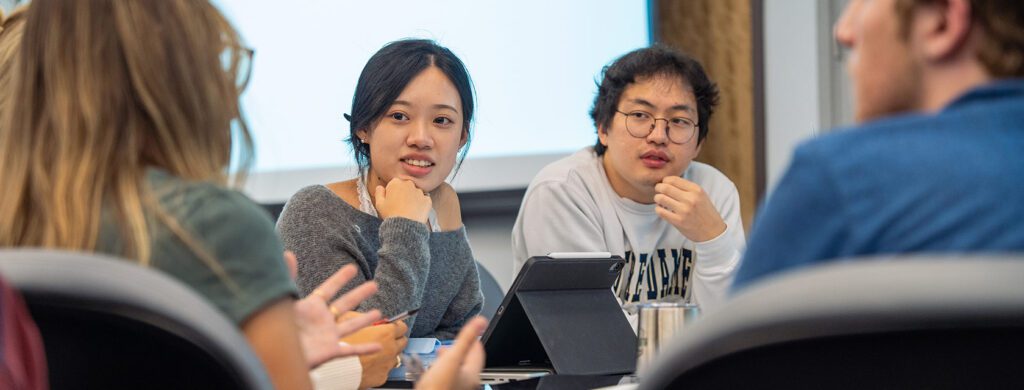Furthering the tradition of innovation across its curriculum, Dartmouth’s Geisel School of Medicine launched its new Learning Collaboratives for Flourishing in Medical Education at the beginning of this academic year. The learning collaboratives encompass academic success, practical wisdom, leadership skills, and career development—emphasizing support for the development of foundational skills that can help future physicians build a balanced and fulfilling life in medicine.
“Our flourishing in medical education curriculum, centered in our On Doctoring program, represents a transformative step in how Geisel supports the holistic delivery of medical education,” says Roshini Pinto-Powell, MD, director of On Doctoring and the inaugural director of Geisel’s learning collaboratives. Integrated into the curriculum more than two decades ago, On Doctoring is a hands-on multidimensional course introducing students to the fundamentals of clinical medicine—Geisel is the first medical school to embed this experience in the curriculum.
Geisel’s learning collaboratives are a result of its longstanding relationship with the Kern National Network and grounded in their Movement for Flourishing in Medicine—an initiative defining flourishing as “wholeness of being and doing, realizing one’s potential and helping others do the same” that advances character caring, and practical wisdom within the medical profession.
Medical education in transition
In 2003 to bring all medical students together through humanism and social service, two Geisel faculty, Joseph O’Donnell, MED ’71, professor of medicine and of psychiatry emeritus, who was deeply devoted to medical student well-being and humanism in medicine, and William Boyle, Jr., MD, professor of pediatrics emeritus, created a model organizing students into several informal “societies” for mentoring and other opportunities. While this model was embraced by the educational community, societies did not persist in the face of the medical school’s curricular changes.
Twenty-two years later, humanism in medicine remains crucial in patient-centered medical education. Flourishing is a concept that has been around for centuries, and with its deep focus on holistic health and well-being, has become part of the conversation around the evolving and complex demands of medical education and medical practice. Research has shown that well-being is a predictor of better physical and mental health outcomes for individuals and communities—an idea well suited to the education and development of future physicians.
Although Geisel is known for its tight-knit and supportive educational community, which organically embraces the concept of flourishing, curriculum constraints kept many aspects of the educational program siloed. “There was less unity across the classes because of the physical separation of foundational science campus for first-and second-year students, and the clinical campus for third- and fourth-year students,” Point-Powell says.
“In On Doctoring we tried for years to get the fourth-year students involved in as many On Doctoring small group sessions as possible, along with service activities, but because of the curriculum we couldn’t make it happen,” she notes. “We believed learning communities may be the answer.”
A collaborative effort
The launch of the Learning Collaboratives is attributable to the collective efforts of a dedicated and thoughtful development team, Sonia Chimienti, Amy Rose, Colleen Kershaw, Barb Homeier, Leah Matthew, and Roshini Pinto-Powell, together with students from the KNN Student Chapter, who began working on this initiative in Spring 2023.

Through focus groups, collaboration with the Center for Program Design and Evaluation, feedback from On Doctoring and Coaching faculty, and iterative engagement with students and educators during two community retreats, the team created a model built on the five goals illustrated in figure 1.
Birth of learning collaboratives
In higher education, learning communities are intentionally designed groups of students who enhance learning through collaboration to achieve academic success, which in the past decade has been embraced by medical education.
While this dynamic exists within Geisel’s deliberately named “learning collaboratives,” the difference elaborates the medical school’s historic focus on humanism in educating the complete physician to include flourishing.
“This was an opportunity for us to think about creating and delivering a curriculum and competency system that embraces a feeling of belonging and well-being that works for our students, for the faculty, and for the institution—and of doing it well,” Pinto-Powell explains.
Last year, Pinto-Powell, a passionate advocate for integrating flourishing into Geisel’s medical education program, created an On Doctoring pilot curriculum focused on building wisdom and character development—a forerunner of the learning collaboratives ethos—in a four-year arc across Geisel’s curriculum.
Broadly defined, the learning collaboratives are small communities encompassing all MD classes within the medical school to foster empathy, resilience, practical wisdom, and leadership. Harking back to O’Donnell’s societies model, medical students are thoughtfully organized into four “houses,’ each with one On Doctoring facilitator teaching clinical skills and helping students build their professional values—the program will be delivered uniformly across all houses including a wide range of long-term research opportunities, service activities, and advising and mentoring. An integrated peer mentoring program is folded into each house, making it easier for third- and fourth-year students to connect with the first- and second years. Ongoing faculty development provides training in advising and mentoring, but each house also has an embedded senior career advisor.
Pinto-Powell acknowledges the stresses and strains in the rapidly changing, complex field of medicine and the world at large may lead to burnout. She believes teaching the concepts of flourishing gives medical students the skills they need to prevent burnout—the ability to navigate personal challenges and the pressures of medical school and medical practice, the emotional resilience necessary to finding meaning in their work, and feeling that they are positively affecting their both patient’s lives and those in the broader community.

